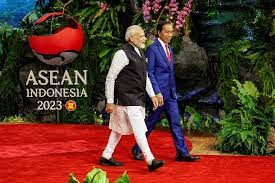JAKARTA: Prime Minister Narendra Modi as well as most ASEAN leaders and guest countries skipped any direct reference to the tensions in South China Sea due to Chinese navy’s “water-cannoning” of fishermen of other countries and Beijing’s release of a new map that lays claim to vast portions of this maritime region.
However, while speaking at the ASEAN-India summit on Wednesday, PM Modi called for building a rules-based post-Covid world order and ensuring a free and open Indo-Pacific.
Many countries, including several of China’s neighbours, do not see Beijing as a violator of these principles. India supports the ASEAN outlook on Indo-Pacific and it will be mutually beneficial to develop a rules-based post-Covid world order as well as efforts by all (Sabka Prayas) for human welfare, suggested the PM.
A day earlier, US Vice President Kamala Harris, at the US-ASEAN summit, had focused on ASEAN centrality. Another member of Quad leaders’ grouping, Australian PM Anthony Albanese touched more on business and has sought a meeting with Chinese President Xi Jinping in near future. Chinese Premier Li Qiang, too, skirted the issue of China’s new map at the China-ASEAN summit on the same day. He had reasons to be conciliatory since leaders of five ASEAN countries last week protested against the release of a new Chinese map that claims the South China Sea, Aksai Chin, Arunachal Pradesh and Taiwan.
The US, India and China are guests at ASEAN and left most of the tough talking to leaders of Malaysia and the Philippines, both ASEAN members.
While describing ASEAN as central to India’s economic strategy, the PM did not give any indication on the government’s next move on the expanded FTA between ASEAN and its first six dialogue partners. India is the only country that has opted out of the Regional Comprehensive Economic Partnership (RCEP), the FTA between ASEAN and China, Australia, New Zealand, South Korea and Japan.
The ASEAN summit this year is without the top leaders of China and the US, the main contestants in South China Sea in which most ASEAN countries have actual maritime claims. However, ASEAN leaders including the Philippines President Ferdinand Marcos Jr and Malaysian PM Anwar Ibrahim made strong statements about territorial integrity at their ASEAN members-only meeting to follow up on their Foreign Offices criticising the new Chinese map. India, too, had lodged a strong diplomatic protest with China for including Aksai Chin and Arunachal Pradesh.


